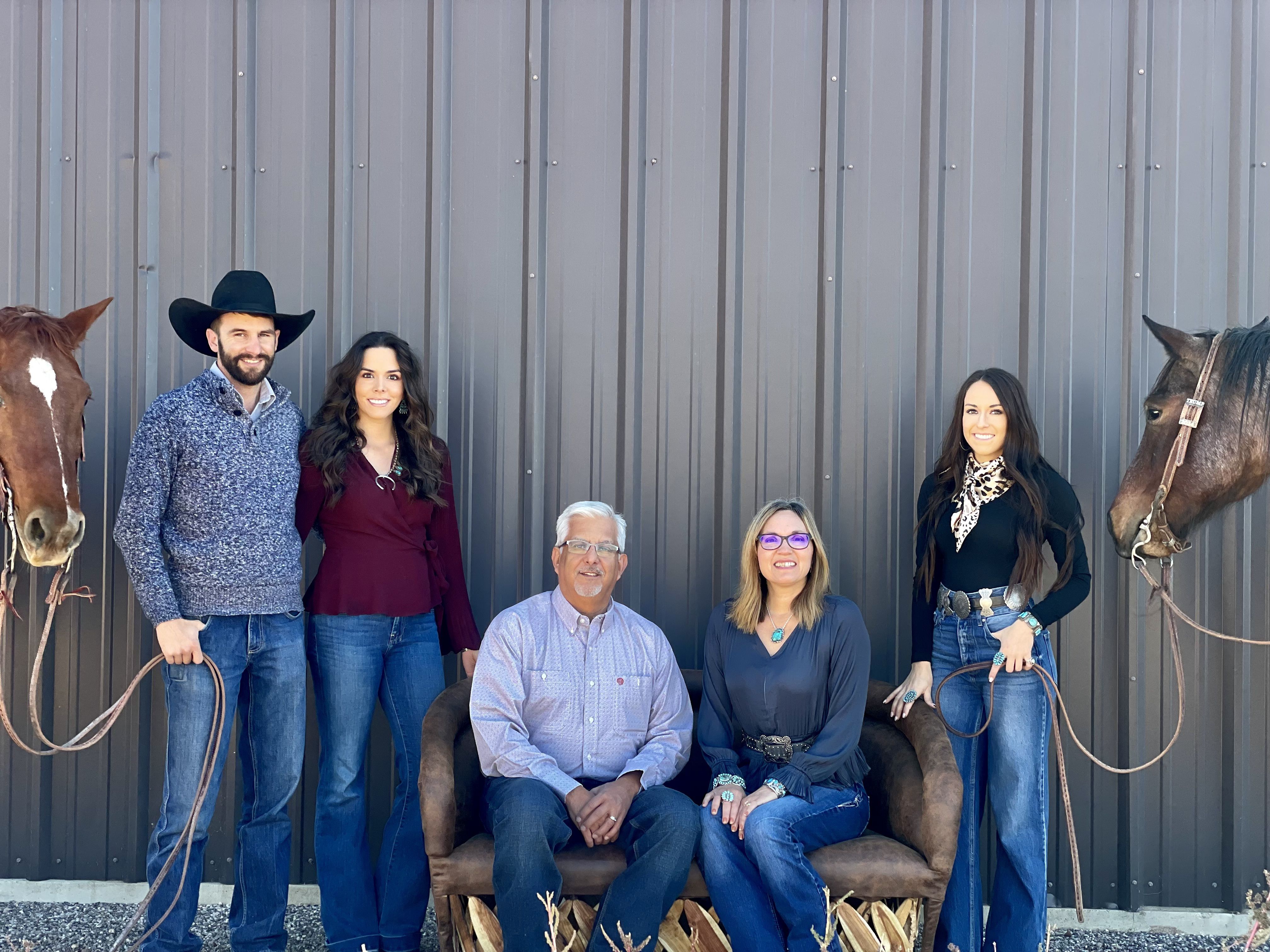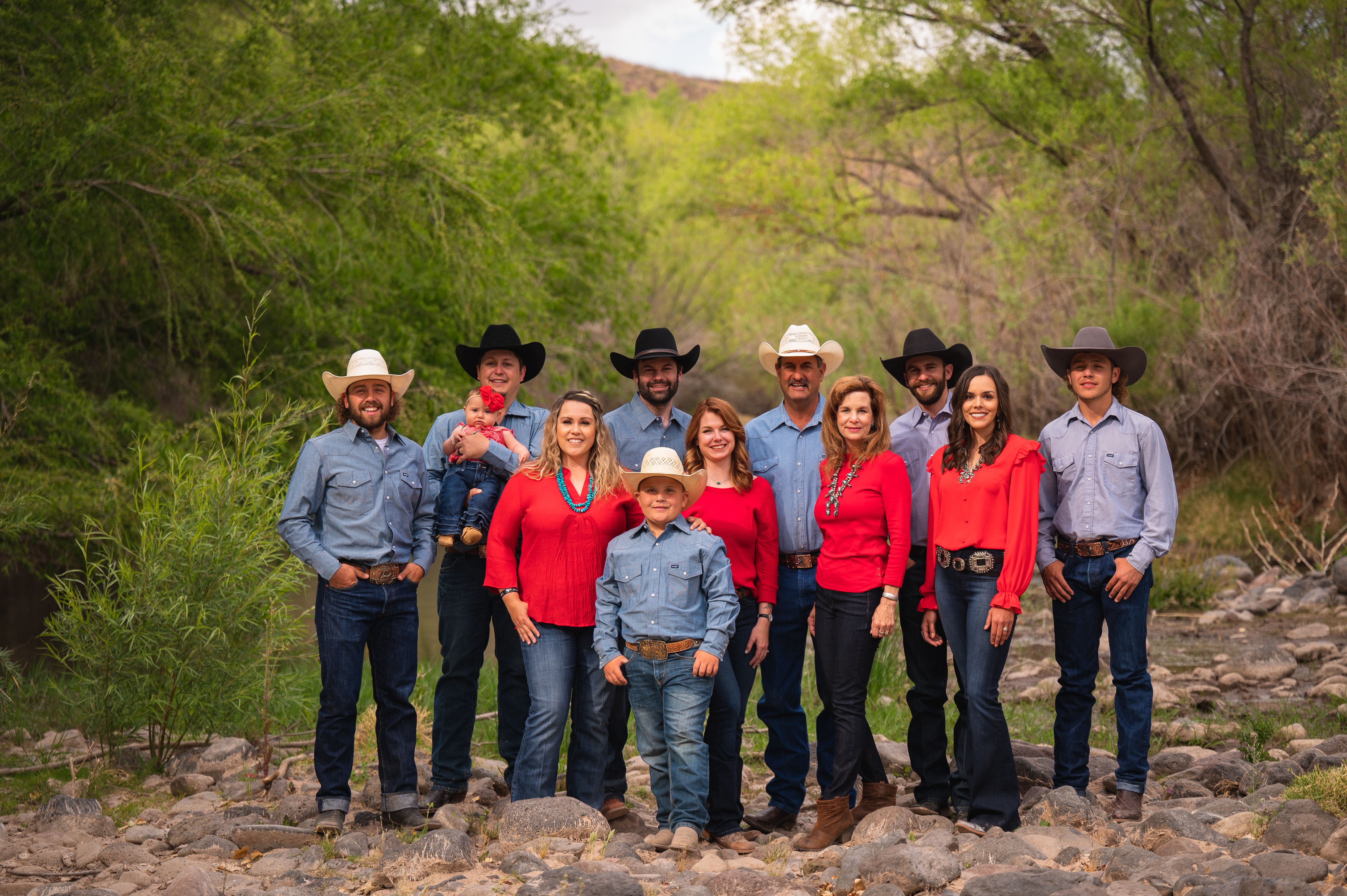Meet Arizona Agriculture’s Ben and Ashley Menges
Author
Published
1/31/2024
Ben and Ashley Menges are two young emerging leaders in the Farm Bureau ranks and within other community organizations, they are part of. Recent national second-place winners in the 2024 Young Farmer and Rancher (YF&R) Excellence in Ag competition hosted by the American Farm Bureau Federation, the Menges’ focus on the future serves as an inspiration to all, certainly, other young people in agriculture wanting to make a difference.
Ben is currently president of Graham County Farm Bureau and Ashley is Arizona Farm Bureau chair of the Young Farmer and Rancher program. Both come from a ranching background but from opposite ends of the state, Ashley from northern Arizona and Ben from southern Arizona.
And as you read their story, you’ll conclude they are truly a “Farm Bureau couple.” Here’s why.

Second-place winners in the American Farm Bureau's Excellence in Ag Competition this year in Utah.
A Ranching profile of Ben and Ashley Menges from Greenlee and Graham County.
An ongoing series of farm, ranch, and agri-business families.
Give us an overview of your background.
Ben: I’m a fifth-generation rancher raised on my family’s ranch in Greenlee County. I grew up heavily involved in 4-H and FFA, I was a member of multiple livestock judging teams and served as a State FFA Officer. I judged livestock for a year at Clarendon College in Clarendon, Texas and then attended the University of Arizona, where I continued livestock judging while adding Collegiate YF&R and Collegiate Cattle Growers to my extracurricular involvement. I hold a degree in Agribusiness Economics and Management. I enjoy spending my free time hunting and reading.
Ashley: I grew up in Holbrook where both my parents were born and raised. My passion for agriculture was fostered through my involvement in 4-H. As a first-generation college student, 4-H introduced me to the University of Arizona where I was a member of the professional agricultural sorority Sigma Alpha, Collegiate Livestock Growers, Collegiate YF&R, the College of Agriculture Ambassadors, and the livestock judging team. In 2016, I graduated with a Bachelor of Science in Agribusiness Economics and Management, and in 2017, with a Master of Science in Agricultural Education.
We are both extremely close to our families, and we credit them for raising us with a foundation based in our faith and teaching us the importance of civic leadership. This year we are celebrating 3 years of marriage and are excited to welcome our first-born child in April.

The Jeffers-Sample family
Discuss your Agriculture Involvement.
Ben: I spend roughly 150 days a year on horseback working cattle, and my primary responsibility is ensuring the cows have enough water. Since water is exceptionally critical in the desert, there are over 100 miles of pipeline on the ranch and over 1.2 million gallons of water storage, so much of my time is focused on water management. The terrain varies from harsh Arizona desert landscapes to rock-covered mountains. This ranch consists of a majority of Bureau of Land Management grazing allotments, because of this, much of my job is advocating for and representing public land ranchers.
Ashley: I am a 4-H and Family and Consumer Health Science (FCHS) Agent for the University of Arizona in Greenlee County. My role consists of creating and implementing positive youth development programs concentrated on the areas of agriculture, civic engagement, healthy living, and STEM. Most of my 4-H effort is spent strengthening the agriculture and livestock projects. One of the most enjoyable things about my job is the work that I do with our county 4-H livestock judging team, this past year we represented Arizona at the National 4-H Livestock Judging Contest.
Talk about your impact on Agriculture.
Ben: Our impact can be summed up in the key areas of advocacy, education, and legislation.
Since the ranch is a majority BLM land, the perception of the public is very important. We have participated in multiple advocacy programs and activities. Some of these activities include Ashley serving as the Voice of Agriculture through the AZFB Friday Food Fact Campaign where she recorded 30 agriculture factual radio clips that aired over a 2-year period. This past fall I was a guest on AFBF President Duvall’s Farmside Chat podcast where I discussed why grazing on public land matters. My participation in the podcast led to the discussion and commitment from the UA CALES Dean to participate in a carbon sequestration study related to grazing. We have created a committee with Farm Bureau representation and university faculty.
Last year we participated in a proposition campaign effort. The campaign was crucial for our state’s agriculture industry, and successfully passed. In recent months we have started working with Arizona Farm Bureau’s government relations team to challenge YF&R membership to get involved with the upcoming election and the new campaign initiative.
Ashley: We both recognize that this generation of students are the next generation of consumers. We participate in multiple agriculture education activities such as the AZFB's "From Farm Fields to Football Fields" program. This program reached 236 classrooms and 5,400 students. We had the opportunity to pen pal with students and host a virtual tour of the Ranch. I worked on a National Agriculture in the Classroom Build-Up Grant that created the "First Agriculture Readers for Many Students (F.A.R.M.S.)" book series. The books were developed through a partnership between the Arizona Farm Bureau and the cooperative extension to foster a love for reading and agriculture at an early age while teaching about agriculture and food production.
Ben: A significant portion of the issues which threaten the survival of agriculture are legislative in origin. I pride myself on the time I spend working on policy and legislative issues to positively impact our state’s agriculture industry. I have had a hand in the creation of multiple bills including the WOLF Act.
Ever since I have been a member of my county Farm Bureau, I have heard about the cotton farmers’ problem with seed germination standards. As county president, I decided to tackle the issue. Cottonseed in many states has a germination standard of 90% or higher. However, our state department of agriculture cannot set germination standards, leading to lower-quality seed being sold in our state. In 2022, I worked with the department to draft bill language that would give the state Department of Agriculture the power to set these standards. Through our grassroots policy development, we passed a policy at our state annual meeting this year to reflect this seed standard goal. This has been one of the legislative priorities this year for our state Farm Bureau.

The Menges Family
Talk about the Issues Facing Agriculture that you see as most important.
Ben: The perceptions of Grazing on Public Lands (National): The truth is that most voters look upon the plight of the American rancher on public lands with indifference. This perception must change, and it is our responsibility as representatives of ranching to lead the conversation. Although we are admittedly biased, we do not believe there is a more vital use of our public land than to feed the public. According to Economist Danny Munch of AFBF, 224 million acres of public land in the U.S. is utilized for grazing operations. Because ranchers maintain these acres, the federal government saves roughly $3.25 billion annually. Public land ranchers maintain water and habitats for wildlife, reduce wildfire risk, maintain land for outdoorsmen, and support rural economies. In general, the concept of "public lands" is new to the majority of those in Washington or east of the Mississippi River, thus giving those who oppose producing food on public acres the opportunity to restrict grazing allotments.
Ashley: Mental Health (State): The unfortunate reality in America is suicide rates in agriculture have reached alarmingly high numbers and exceed the national rate. The epidemic of suicide is also affecting most rural communities. According to the CDC, rural counties consistently have higher suicide rates than their metropolitan counterparts. In Arizona, 60% of adults with mental illness receive no mental health treatment, and we are ranked 50th in the country for providing access to mental health services. I've worked alongside the Arizona Farm Bureau to apply for and receive a Western Region Agriculture Stress Assistance Program grant. This grant will be the first step to aiding with mental health issues and the high suicide rate. The program allows Farm Bureau leaders and staff, extension employees, Department of Agriculture staff, and others interacting directly with agriculturalists to participate in Mental Health First Aid Training.
Ben: The Endangered Species Act & the Mexican Gray Wolf (Local): It is fair to say the Endangered Species Act has presented certain obstacles for ranchers. A particularly egregious example of this is the federally protected Mexican Gray Wolf. When the first wolves were introduced in 1998, I was a first grader, so I have been talking about this species for an inordinate portion of my life. The obvious problem with reintroducing a predatory species is that ranchers want to produce beef for people to eat, and not wolves. There are several costs because of the wolf presence which currently ranchers can never hope to be compensated for. Among these are decreased conception rate and weaning weights, increased labor costs for range riders, added costs of hay, and depredations that occur in the act of birth. Ranchers must be compensated for all wolf-related losses if they ever hope to coexist with the species; it is the only recourse they have. While the species I am most familiar with is the Mexican Gray Wolf, I know protected species are presenting costs to producers across the nation, and elected officials must have the conversation of fair compensation for ranchers who live with this predatory animal.
A solution that I have worked on and supported to address this issue is the proposed WOLF Act, which fairly reimburses ranchers for all costs and provides them with a way to survive as the wolf population increases. The WOLF Act originated through the Farm Bureau grassroots system. If the act were to pass, it would be a large feather in the Farm Bureau hat but would also provide the much-needed support for the bottom line of ranchers who live with the uncompensated presence of wolves. We hope to see the WOLF Act pass in the 2024 Farm Bill.
What Are Your Future Plans and your Goals?
Ben: As Graham County Farm Bureau president, one of my goals is membership growth. In my remarks at our county annual meeting last August, I set the goal of doubling our membership by August 2024.
I aim to raise registered Angus bulls to sell to ranchers in the area. I plan to keep this seedstock herd in the steepest, roughest, and rockiest pasture to ensure they are ready for any operation. Expanding the seedstock operation and continuing to improve carcass genetics for this ranch and others will be a fun project in the coming years.
Ashley: I would like to host a YF&R 5 C's 5K run, where each kilometer of the race is lined with signs educating participants about one of the 5 C's and the value that it plays to our community and state. All the proceeds raised would go to our local food charities.
Ben and I have really enjoyed our roles and service with Farm Bureau would like to serve on the AFBF YF&R National Committee and launch an agriculture podcast. For the past few years, we have been working We are currently working on introducing meat sales to our business plan.
We hope to make these goals happen and look forward to carrying the tradition of agriculture to the next generation.
Ben and Ashley’s Leadership Experience at the County Farm Bureau follow:
Ben
- County Farm Bureau Board, President (2021-Present)
- Policy Development Chair (2019-2021)
- County Policy Development Committee (2016-Present)
- County Farm Bureau Board, Vice President (2019-2021)
- County Farm Bureau Board Member at large (2017-2019)
- County Farm Bureau Annual Picnic Planning Committee (2019-Present)
- County Young Farmer & Rancher Chair (2016-2019)
- County Farm Bureau Ag Day Planning Committee(2016-Present)
- County Farm Bureau Scholarship Selection Committee (2016-2019)
Ashley
- County Farm Bureau Board, Treasurer (2021-Present)
- County Farm Bureau Annual Meeting Planning Committee
- County Farm Bureau Policy Development Committee (2017-present)
- County Farm Bureau Scholarship Selection Committee (2017-2019)
- County Farm Bureau Agriculture Education Event Committee (2017-2019)
- County Farm Bureau Board, YF&R Chair (2017-2019)
Ben and Ashley’s State Farm Bureau Involvement
Ben
- AFBF: Partners in Advocacy and Leadership, PAL Class 11, (2022-present)
- AFBF: Federal Lands Issues Advisory Committee Chair (Present)
- AFBF: Federal Lands Issues Advisory Committee member (2022-present)
- State Farm Bureau Board, Board Member (2021-Present)
- State Federal Lands Committee Chair (2023-Present)
- Standing Committee: Credentials Committee (2023)
- Standing Committee: Financial Review (2023)
- Special Committee: Bovine Trichomoniasis (2023)
- Special Committee: Foreign Land Ownership (2023)
Ashley
- AFBF Women’s Leadership Bootcamp, Participant (2018)
- State Young Farmers and Ranchers, Chair (2017-Present)
- Collegiate YF&R Discussion Meet State Winner
- Collegiate YF&R Discussion Meet Sweet 16 Contestant
- State Farm Bureau Educational Farming Company, Board Member (2020-Present)
- YF&R Discussion Meet State Winner
- YF&R Discussion Meet Sweet 16 Contestant
- State Farm Bureau Membership Committee Member (2022-Present)
- State Farm Bureau Budget Committee Member (2022-Present)
- State Farm Bureau Federal Lands Committee Member (2017-Present)